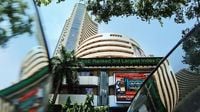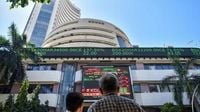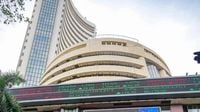On April 18, 2025, the Indian stock market will remain closed in observance of Good Friday, a significant day for Christians marking the crucifixion of Jesus Christ. Both the Bombay Stock Exchange (BSE) and the National Stock Exchange (NSE) will be shut for the entire day, halting all trading activities, including equities, derivatives, and currency segments. This closure is part of the official stock market holidays announced at the beginning of the year, and it follows a short week of trading for investors.
The Multi Commodity Exchange (MCX) will also remain closed for both the morning and evening trading sessions on Good Friday. While there have been instances where the MCX has operated in the evening, this particular holiday will see a complete suspension of trading. Investors will have to wait until Monday, April 21, 2025, when trading resumes under regular market hours, which typically include a pre-open session from 9:00 AM to 9:07 AM, followed by regular trading from 9:15 AM to 3:30 PM.
This Good Friday marks the conclusion of three stock market holidays in April, with previous closures on April 10 for Mahavir Jayanti and April 14 for Ambedkar Jayanti. The next holiday on the calendar is Maharashtra Day on May 1, followed by Independence Day on August 15 and Ganesh Chaturthi on August 27. October is set to be the month with the most holidays, featuring three closures: Gandhi Jayanti/Dussehra on October 2, Diwali on October 21, and Diwali Balipratipada on October 22.
Despite the market closure, the previous trading week was notably positive for the Indian stock market. The benchmark indices, Sensex and Nifty, recorded significant gains, driven by strong foreign institutional investor (FII) inflows and favorable domestic economic conditions. On Thursday, April 17, the Sensex surged by 1,508.91 points, or 1.96%, closing at 78,553.20, while the Nifty50 rose by 414.45 points, or 1.77%, ending at 23,851.65. This rally marked the fourth consecutive day of gains for the indices.
Vinod Nair, Head of Research at Geojit Investments, commented on the market's performance, stating, "The market ended the holiday-shortened week on a strong note, rallying nearly 2% on the weekly expiry day, driven by favorable domestic cues. After a choppy start, the Nifty gained momentum as the session progressed, retesting its March high of 23,869.60 before closing at 23,840.10." He noted that the banking sector played a crucial role in this rally, with banking stocks leading the charge.
Investor sentiment has been buoyed by a combination of factors, including a pause in reciprocal tariffs by the United States and forecasts of an above-normal monsoon in India, which has historically contributed to robust agricultural output. The current macroeconomic environment remains supportive, encouraging investors to increase their exposure to riskier assets for long-term gains. Nair emphasized, "The domestic macroeconomic environment remains strong, and many investors are willing to take more risk in the hope of better long-term returns."
However, caution is advised as analysts warn of potential weaknesses in earnings for the last quarter of FY25 due to low demand and pressure on company margins. Nair suggested that investors should focus on sectors that depend on the Indian economy, such as banking, consumer goods, healthcare, transport, and infrastructure, rather than those linked to exports.
As the markets prepare to resume trading on April 21, experts anticipate that investor interest will largely depend on company-specific news and upcoming earnings reports from major firms, including Infosys, HDFC Bank, and ICICI Bank. Management commentary during these earnings announcements will likely play a pivotal role in shaping market sentiment in the short term.
In summary, while April 18, 2025, will see the Indian stock market closed for Good Friday, the preceding week has set a positive tone for investors, with significant gains in the indices and encouraging economic indicators. The upcoming trading week promises to be pivotal as companies release their earnings, and investors look to adjust their strategies accordingly.









